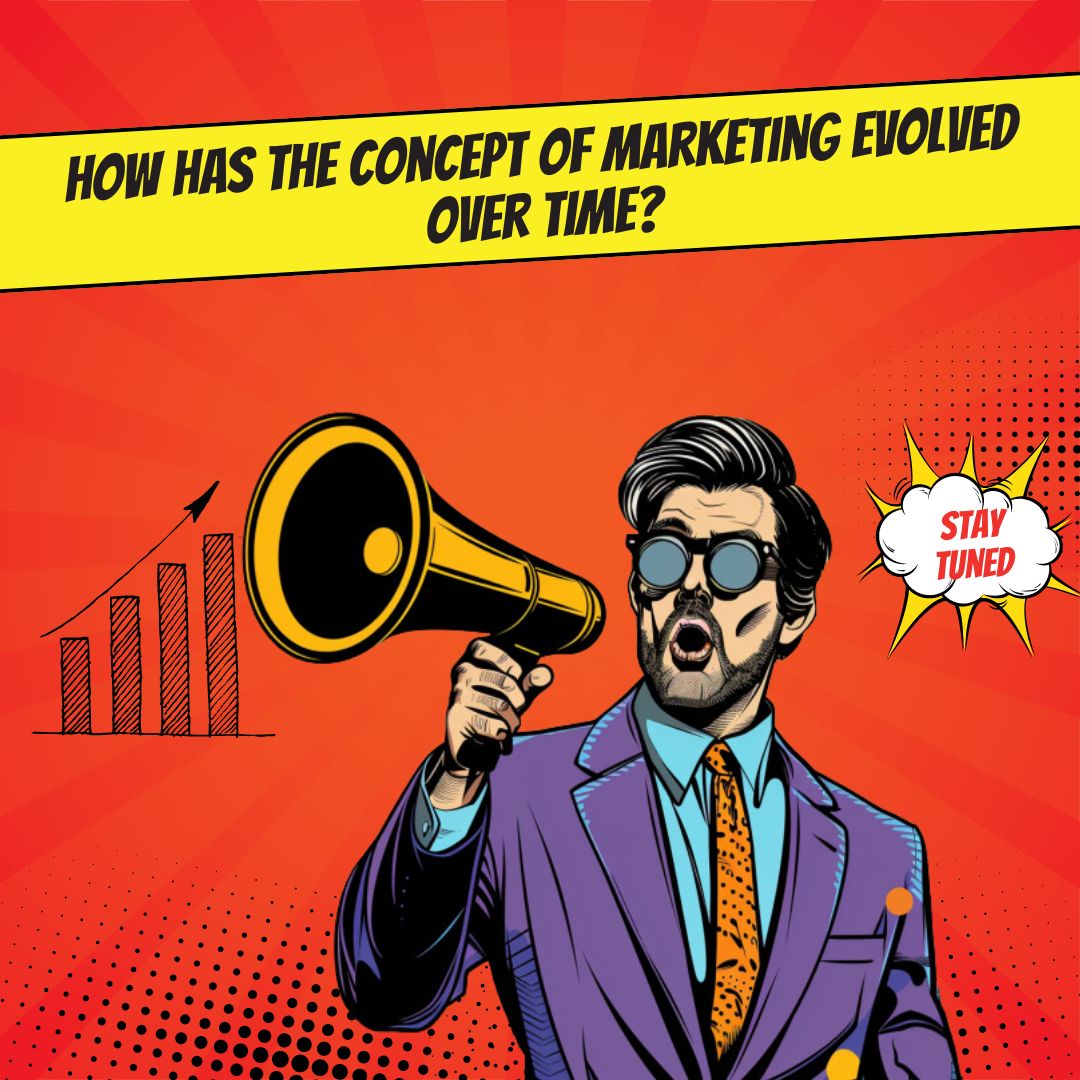Key Takeaways
✅ The concept of marketing involves identifying, anticipating, and satisfying customer needs and desires profitably, using a mix of strategic activities like market research, product development, promotion, and distribution.
✅ Effective marketing focuses on building strong relationships with customers through consistent communication and engagement, ensuring brand loyalty and long-term business success.
✅ It requires a deep understanding of target markets and continuous adaptation to changing consumer preferences and market conditions.

Introduction
Ever wondered why some businesses skyrocket while others barely take off? It's all in the power of marketing. Picture this: you've got a killer product, but without the right strategy, does it really exist in the eyes of your customer? The concept of marketing is much more than just selling stuff; it's about creating a story that resonates, building relationships, and most importantly, delivering value. Now, are you ready to unravel the strategies and principles that lay the golden eggs of business success?
In this article, not only will you grasp the definition of marketing, but you'll also explore different approaches tailored to wowing your audience. Whether you're a seasoned pro or a curious newbie, get ready for some game-changing tactics that could shoot your brand to stardom. Sit tight, because we're about to embark on a journey into the heart of what marketing really is—and how you can harness its full potential to not just meet, but exceed your business goals. Let's unlock those doors to success together, shall we?
In this article, not only will you grasp the definition of marketing, but you'll also explore different approaches tailored to wowing your audience. Whether you're a seasoned pro or a curious newbie, get ready for some game-changing tactics that could shoot your brand to stardom. Sit tight, because we're about to embark on a journey into the heart of what marketing really is—and how you can harness its full potential to not just meet, but exceed your business goals. Let's unlock those doors to success together, shall we?
Top Statistics
| Statistic | Insight |
|---|---|
| Global Digital Advertising: $378 billion spent in 2020, up 9% from 2019. (Statista) | Shows how businesses are increasingly investing in digital to reach customers where they spend a lot of their time: online. |
| Social Media Spend: A third of digital ad spend in 2020. (eMarketer) | Highlights social media's giant footprint in the marketing world, don't you think? |
| Video Ad Spend: Predicted CAGR of 8% from 2020-2025. (eMarketer) | Video content isn't just cat videos on the internet – it’s becoming a key player for marketers worldwide. |
| Influencer Marketing: $15 billion expected spend by 2022. (Business Insider Intelligence) | This jump shows the power of credibility and relatability in marketing through personalities that consumers trust. |
| Mobile Impressions: Nearly 70% of all digital ad impressions in Q3 of 2020. (PubMatic) | Mobile is king – it’s where the eyes are, so it's where the ads are flowing. Mobile strategy is crucial. |
The Heart of Marketing: The Four Ps
Ever caught yourself in a conversation about what makes a brand tick? Well, the Four Ps of marketing (Product, Price, Place, Promotion) are your go-to answer. Picture these Four Ps as the engine under a car's hood, driving the business forward. The product needs to solve real problems or fulfill desires, while the price should match the value your customers attribute to it. Then there's place: where are you selling this amazing product? Whether it's a cozy shop on Main Street or an online store, it has to be accessible. And finally, promotion – how will you tell the world about your product? This P includes everything from advertising to social media buzz.
When Strategies Dress for the Occasion
Choosing the right marketing strategy feels a lot like picking the perfect outfit for an occasion. There's no one-size-fits-all; instead, businesses mix traditional methods with the ever-changing landscape of digital marketing to meet customers where they hang out. Inbound marketing draws customers in with valuable content, while outbound marketing goes out to get their attention. And then there's the B2B (business-to-business) vs. B2C (business-to-consumer) divide – like choosing between a formal suit for a corporate event or a casual dress for a friendly gathering.

Crafting a Plan with Marketing Research and Analysis
Have you ever set up a lemonade stand as a kid? You had to figure out the best spot to set up, the price people would be happy to pay, and how to let them know you were open for business. Marketing research and analysis is a grown-up version of that. It's about asking and answering all sorts of questions before you dive in. What do the folks walking by want in their lemonade? How much lemonade is already out there? By getting to know these things, you're more likely to see smiling faces and hear the clink of coins in your jar.
Now, let's break it down a bit. Market segmentation helps you sort everyone into groups - like kids who love sweet lemonade, or gym-goers who want something refreshing after a workout. This helps you speak their language. Then you've got to snoop around a bit, but in a good way. See what others are doing and how you can do it better or different. That's keeping tabs on competitors. And don't forget about keeping an eye on trends and changing tastes. That's consumer behavior for you.
Executing with Effective Marketing Tactics
So, you've done your homework, you know your customers, and you're ready to shout from the rooftops. Time for some effective marketing tactics. Picture your lemonade stand again. What if you had a secret recipe or a funky cup that everyone talked about? That's your brand – make it memorable. And how about a sign that makes people laugh so much they just have to stop by? That's engaging content.
Let's get digital for a second. Imagine your lemonade stand has a Facebook page where you share jokes and interesting lemon facts. That's making the most of social media. And emails? What if you send a message saying, "Hey, it's going to be hot tomorrow. How about a cold lemonade at half-price?" That's an email people want. Lastly, when people search "best lemonade near me" and your stand pops up, that's because you've made friends with Google through SEO. Each tool is like a handy gadget in your belt, ready to fix a problem or build something new.

Gauging the Impact with Measuring Success
Now we're not just tossing lemons and hoping for the best. We need proof our stand is the talk of the town. That's where measuring success comes into play. Think of Key Performance Indicators (KPIs) as those little flags popping up every time you sell a glass – they tell you what's working and what's not. Then there's Return on Investment (ROI). That's knowing whether the cash you put into those fancy cups and premium lemons is actually bringing in more smiling customers and more coins in your jar.
And let's say you're curious about who comes by when, and which sign brought them over. There are tools for that too, like Google Analytics. They're kind of like a high-tech security camera for your stand, giving you all the juicy details. When you understand all this data, you can tweak your recipe, switch up your signs, or even decide it's time to introduce a new mango twist. Whatever it is, measuring means you're playing to win.
So, in your journey to make that lemonade stand the best in town, remember this: Do your research, choose your tactics wisely, and always measure the results. It's the tried-and-true recipe for success, in lemonade and in marketing.
AI Marketing Engineers Recommendation
Recommendation 1: Embrace Storytelling in Your Marketing Approach: Human beings are wired for stories. Instead of bombarding customers with statistics and features, weave your product's benefits into a tale that resonates with your audience's daily lives. Did you know that messages delivered as stories can be up to 22 times more memorable than just facts? Use that power to make your brand unforgettable.
Recommendation 2: Leverage Data to Personalize Customer Experiences: In the age of information, personalization is key. Consumers don't just want to be another sale; they want to feel unique and valued. Use data analytics to understand purchasing behaviors and preferences to tailor marketing messages. Current trends show that personalized email campaigns, for example, can increase transactions by six times.
Recommendation 3: Incorporate Social Proof into Your Marketing Channels: Word-of-mouth has always been a powerful tool, but in our digital world, social proof has taken over. Show potential customers that others trust and value your brand. From ratings and reviews to user-generated content, actual customer opinions can significantly influence buying decisions. In fact, nearly 95% of shoppers read online reviews before making a purchase. Don't let your brand miss out on this opportunity.

Conclusion
So, we've had a little adventure through the bustling world of marketing, haven't we? Think back on that first cup of coffee you had this morning – and how you chose that brand over countless others. That's marketing in action: helping you decide, without you even realizing you're being guided.
At its heart, marketing is really about creating value for customers. It's a process that starts with you, whether you're a big-time entrepreneur or the little shop around the corner. And you've got to admit, getting the mix right between those Four Ps sounds more like alchemy than dry business strategy, doesn't it?
Remember when we touched on the tug-of-war between traditional and digital marketing? It's a little like choosing between a cherished vinyl record and a streaming service. Each one has its charms and fits certain moments. And just like music, marketing strategies should make you feel something, connect with you – whether it's through a billboard you pass every day or an ad that pops up on your phone.
The thing is, marketing isn't just about selling stuff. It's about telling stories that resonate, building relationships, and making sure those tales reach the right ears. With every step you take from brand building to SEO, you're layering your story, making it irresistible.
We also chatted about those analytical tools, didn't we? They're the compasses and maps that help you navigate through the wilds of customer behavior and market trends – ensuring you don't lose your way as you tailor those tales.
So, what's next on this winding road? Well, that's the exciting part, isn't it? Marketing is always on the move, weaving through new trends and technologies. The marketers who thrive are the ones who listen to the whispers of change and aren't afraid to dance to a new rhythm.
Take a moment before you go back to plotting world domination through your next campaign. Think about where you'll steer your ship next in this vast ocean of possibilities. Because, at the end of the day, understanding the concept of marketing means knowing how to sail with the winds of customer desires, doesn't it?
Hold onto that notion of creating real value and being genuinely customer-focused, sprinkle in some adaptability, and who knows what peaks you'll reach next? Are you ready to chart those undiscovered territories?

FAQs
Question 1: What is the definition of marketing?
Answer: Marketing is all about the things people do to get the word out about their products or services. It's a mix of selling, promoting, and making sure what you offer meets the needs and wants of customers, all while aiming for the company's goals.
Question 2: Why is marketing important for businesses?
Answer: Think of marketing as a megaphone—it's how businesses can shout out to the world about what they offer. It's the way to grab people's attention, drive sales, hook in loyal fans, and keep the business growing strong.
Question 3: Who are the main participants in the marketing process?
Answer: In the big marketing dance, the main folks shaking a leg are marketers (setting up the band), consumers (grooving to the rhythm), suppliers (providing the instruments), intermediaries (like the club owners and promoters), and the other bands in town (competitors).
Question 4: How does market research fit into the marketing process?
Answer: Market research is like a treasure map. It guides marketers through the jungles of consumer minds, tracks trends, spots what folks fancy, and keeps an eye on other treasure hunters (competitors). It's the compass for navigating decision-making.
Question 5: Can you explain the 4 Ps of marketing?
Answer: Imagine marketing as cooking. The 4 Ps are your ingredients: Product (what's your dish), Price (what's the tab), Place (where to serve it up), and Promotion (how you get folks to drool over it).
Question 6: What is the difference between traditional and digital marketing?
Answer: Traditional marketing is like mailing a handwritten letter, using old-but-gold channels like newspapers, TV, or billboards. Digital marketing is like a group chat online—it's all about connecting via the internet, using websites, social media, emails, and getting Google to notice you with SEO.
Question 7: How does segmentation help in developing effective marketing strategies?
Answer: Segmentation is like slicing up a pizza so that everyone gets their favorite topping. By breaking the audience into bite-size groups that share similar likes, marketers can dish out messages that hit the spot.
Question 8: What are some common marketing challenges faced by businesses today?
Answer: Some headaches for businesses include keeping up with the fast food-like speed of changing tastes, trying new tech gadgets, being consistently cool across all places they show up, shining brighter than others, and figuring out if the money they're throwing in is giving them a good bang for their buck.
Question 9: Can you discuss the role of storytelling in modern marketing?
Answer: Storytelling turns brands into bedtime stories that stick with you. It wraps up products in tales that touch hearts and gets people chatting around the campfire, making the brand feel like a close buddy.
Question 10: What are some emerging trends in the field of marketing?
Answer: The new kids on the marketing block include personal touches, smart robots (AI), having influencers preach your gospel, stepping into sci-fi worlds with AR/VR, making sure smart speakers get you, and cozying up in social media's hidden nooks.

Academic References
- Kotler, P., & Keller, K. L. (2019). Marketing management. Pearson Education India. This pivotal book from Philip Kotler, often hailed as the marketing guru, dives into the art and science of marketing. It talks about understanding your audience, crafting your message, and making sure it lands well. Think of it as a blueprint for making customers' needs meet what you're offering.
- Perreault Jr, W. D., McCarthy, E. J., & Cannon, J. P. (2020). Principles of marketing. McGraw-Hill Higher Education. Imagine this as your A to Z guide on marketing. Here the authors break down the game into simple, actionable parts – the product, the price, the place, and all-important promotion. It's about the exchange, the dance between buyers and sellers, and the value everybody's after.
- Sheth, J. N., & Parvatiyar, A. (Eds.). (2006). The sage handbook of marketing theory. Sage Publications Ltd. This is where the thinkers of marketing spill their thoughts. It's a treasure trove of essays that talk about where marketing's been, where it's heading, and all the fancy footwork in between. From old-school relationship marketing to the shiny new trends, it's all in here.







